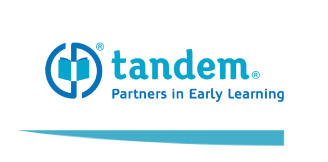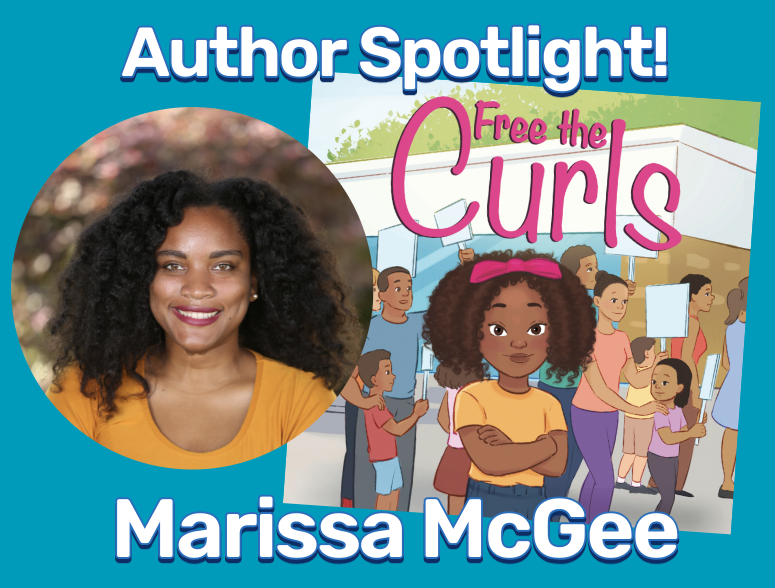
Marissa McGee is an anti-bias educator and the author of Free the Curls currently living in the East Bay. Marissa’s mission is to create books that serve as mirrors and windows for children. Statistics compiled by the Cooperative Children’s Book Center show that 14% of children’s books feature main characters who are Black. Less than 10% of stories that highlight Black characters are written by Black authors. With this own-voices story, Free the Curls aims to change that. This book features an inquisitive six-year-old girl named Maliyah and inspires children from all races to be changemakers in their community.
The interview below is the second of a two-part post sharing a recent conversation featuring McGee and Tandem’s Executive Director Savitha Moorthy. In case you missed it, check out part 1 on the Tandem blog!
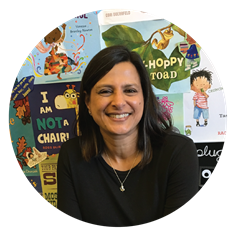
Savitha Moorthy
Executive Director, Tandem
Thank so much for joining me today to talk about Free the Curls, diverse books, and more. Let’s jump right in!
People often ask us at Tandem how to talk about racial equity with a five-year-old. For me, the answer is always that your start by teaching them compassion; you start by teaching them empathy. Then, you teach them how you can take action when you see something happening that is unfair or unjust. How does this relate to your work as an anti-bias educator?
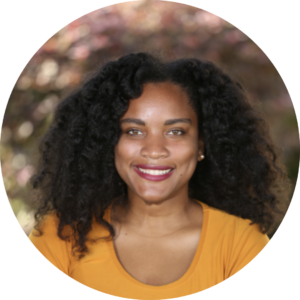
Marissa McGee
Author, "Free the Curls"
As an anti-bias educator I think about ways to affirm students’ identity. What opportunities are there to reflect diversity and spark respectful curiosity and spark that empathy piece, or helping them to recognize justice and injustice and then take action, of course, in a way that feels developmentally appropriate for them? I feel like my author journey and my journey as an anti-bias educator have really overlapped in a way that just feels like everything is in alignment.
I use picture books in my anti-bias work all the time. I was really surprised to learn that Free the Curls has been used in high school classrooms to discuss social justice.
I think children’s books are amazing. Before I wrote Free the Curls, I had a section on my vision board that was all about writing. There was a note that said, “Small Books, Big Lessons.” I think that’s what picture books are. To be able to pick up this book that has less than 40 pages, but to engage in these meaningful conversations…I think children’s books are a tool that we should be using more often.
Savitha: Almost like creating that familiarity then creates a safe space for taking some risks with your learning. Have you seen examples where your book, or books like yours, have made an impact in schools and in communities?
Marissa: Someone sent me a message recently, and they shared a photo at a store where the skin care products were locked up. This woman’s four-year-old son, a white boy, said, “We have to protest. I read about this in Free the Curls.” His mom sent me that message to let me know that I was having an impact. She also said they need to read the story a few more times, so that her son understands the nuances in the book. 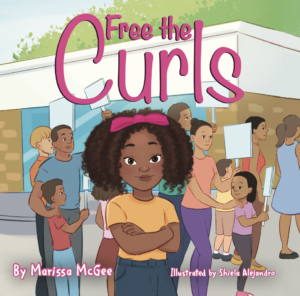
I’ve also had some parents of Black children with curly hair say, “My child didn’t like their curls. And after reading your book, they love them.” I try to be really intentional when I sign books to kids with curly hair. I say, “May you love this book as much as you love your curls.” This affirms their identity, especially in the Black community, where we have different ideas about hair. It’s definitely a journey to love your hair and who you are.
But, really, the piece that’s been impactful for me is readers telling me that their children want to learn more about protests. Or when they go to a store, they’re looking to see which products are on open shelves and which aren’t. I feel it’s also impactful to know this book is raising awareness.
Savitha: When I was reading your book to my son’s kindergarten class, I was a little nervous about how the teacher might react. When I finished reading the book, I asked the class, to tell me something that they noticed or liked from the book.
The teacher was the first person to raise her hand. She said, “This book taught me something about a group of people that I didn’t know about.” And I thought that’s really powerful for these five-year-olds to see their teacher model that kind of curiosity and interest in learning about communities that are different from hers.
That’s when it brought home to me that the work that we do at Tandem, it’s centered on the children, but the family members and the educators are also taking away some important lessons from our work. What are some of the barriers that we have in accessing culturally relevant books, especially for children who come from underserved communities?
Marissa: Where do I begin? I think even one barrier to start with is just the struggle to create the book. This idea of racial battle fatigue is so real and exhausting. One of my goals is to thrive, but sometimes I feel like I’m just surviving as a Black woman.
I am asked all the time, “When are you going to write another book?” But I’m just not in a space where I feel that I can rest and be creative to produce something like this again. Just trying to survive at times can be a barrier because it’s hard to be creative when you feel like you’re in survival mode.
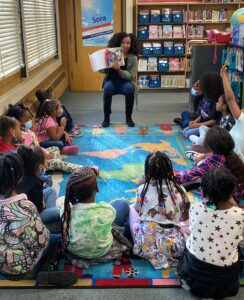
There’s also an attack on books that represent diversity. No matter how hard I try, it will never make sense to me. Your story should always be affirmed. Who you are should always be affirmed. This is not a zero sum game.
Savitha: Just because you tell your story doesn’t mean that there’s less room for somebody else’s story. I would hope that we live in a world where there’s room for all kinds of people to tell all kinds of stories about themselves.
Marissa: There’s an Audre Lorde quote that shares that it’s not our differences that divide us, it’s our inability to recognize and celebrate those differences. I’m like, YES!
Let’s just celebrate who we are. That’s what makes life so amazing – we’re all different. We also have a lot of similarities, but there are also so many differences that make us unique. We should be celebrating that.
Follow Marissa McGee on Instagram: @FreetheCurlsFTC. Get copies of Free the Curls on Marissa’s website: https://freethecurlsftc.com/.
